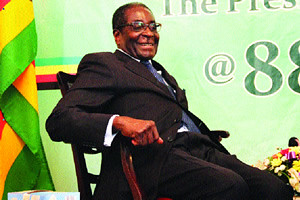
Republic of Zimbabwe President Robert Mugabe holds discussion with journalists on the eve of his 88th birthday in the Southern African state. The country has fought sanctions for over two decades., a photo by Pan-African News Wire File Photos on Flickr.
‘UN general assembly a disappointment’
Saturday, 29 September 2012 00:00
Caesar Zvayi recently at the UNITED NATIONS, New York
PRESIDENT Mugabe has expressed disappointment with the 67th Session of the UN General Assembly, describing it as one of the same ordinary repetitive sessions world leaders have held in the past.
Speaking to journalists on arrival at the Harare International Airport from the UN headquarters yesterday morning, the President said the state of the UN bids the developing world to move seriously on reforms.
‘‘It wasn’t a good meeting in the sense that the issues that should have been prominent, issues to deal with unilateralism and multi-lateralism, were sidelined.
‘‘In the General Assembly, the people were just making statements, for instance US president Barack Obama. He just talked about Stevens (the US ambassador who was killed in Libya), nothing that was global, in terms of how the world should move in reforming the UN.
‘‘Yes, we had statements that were made on reforming the UN, but they were just statements. There is need for real movement by the developing world.
“It’s as if we are the minority yet those who have the veto are in fact the minority.’’
The build-up to the 67th Session of the UNGA that officially opened on Tuesday under the theme “Bringing About Adjustment or Settlement of International Disputes or Situations by Peaceful Means”, was characterised by debate on the relevance of the UN to the prevailing geo-political challenges confronting the world.
A high level meeting on the Rule of Law at the International and National Level that convened on Monday was naturally dominated by debate on the need to reform the UN system to make it democratic and effective.
The document released at the end of the meeting implored member states to be bound by the founding principles of the UN, among them the sovereign equality of member states.
In his address to the General Assembly on Tuesday, US president Barack Obama made an impassioned address about the death of the US envoy, a refrain that was picked by many speakers drawn from the western block.
President Mugabe who took the podium on Wednesday, reminded Mr Obama that his country was a member of the same Nato that had killed Colonel Gaddafi, and slammed the US and its allies for practising double standards in mourning Stevens condemning his killing while remaining mum on Gaddafi.
President Mugabe reiterated the global concern in his address on Wednesday, calling for the reform and realignment of the UN, its specialised agencies, and international financial institutions in line with global challenges and contemporary realities.
These agencies, President Mugabe said, are the only instruments available for responding effectively to the global challenges the world faces.
He reiterated Zimbabwe’s support for ongoing inter-governmental negotiations on the reform and expansion of the Security Council, and cautioned against an open-ended approach that shortchanges countries that are not represented on the Security Council.
Zimbabwe, he said, stood by Africa’s demand for two permanent seats complete with a veto, if the veto is to be retained, plus two additional non-permanent seats, as clearly articulated in the Ezulwini Consensus and the Sirte Declaration.
He said Africa will not be bought off with empty promises, not cosmetic tinkering disguised as reform of the Security Council.
The President decried the foisting of unacceptable concepts on UN member states without inter-governmental mandates.
He cited the abuse of the concept of responsibility to protect in the absence of agreement on the circumstances under which it might be evoked, a development that he said compromised and undermined the cardinal principles of state sovereignty, territorial integrity and non interference in the domestic affairs of member states.
President Mugabe urged member states to take stock of the inspiring preamble of the UN Charter in the wake of the radical departure from its noble and solemn declarations.
He called on the Security Council, which is still dominated by the five victorious allies of the Second Anglo-Saxon War, to respect and support the decisions, processes and priorities of regional organisation.
He condemned the illegal economic sanctions regime that the United States, the European Union and their allies imposed on Zimbabwe in the wake of a bilateral dispute between Harare and London and reminded Washington and Brussels that there was international consensus, fully backed by Sadc, the AU, Comesa, the Non-Aligned Movement and the progressive world that the sanctions must be promptly and unconditionally lifted.
Before his address, President Mugabe held bilateral meetings with Presidents Hifikepunye Pohamba of Namibia, Obiang Nguema Mbasogo of Equatorial Guinea, and Michael Sata of Zambia.
Details of the meetings were not released to the Press.
No comments:
Post a Comment